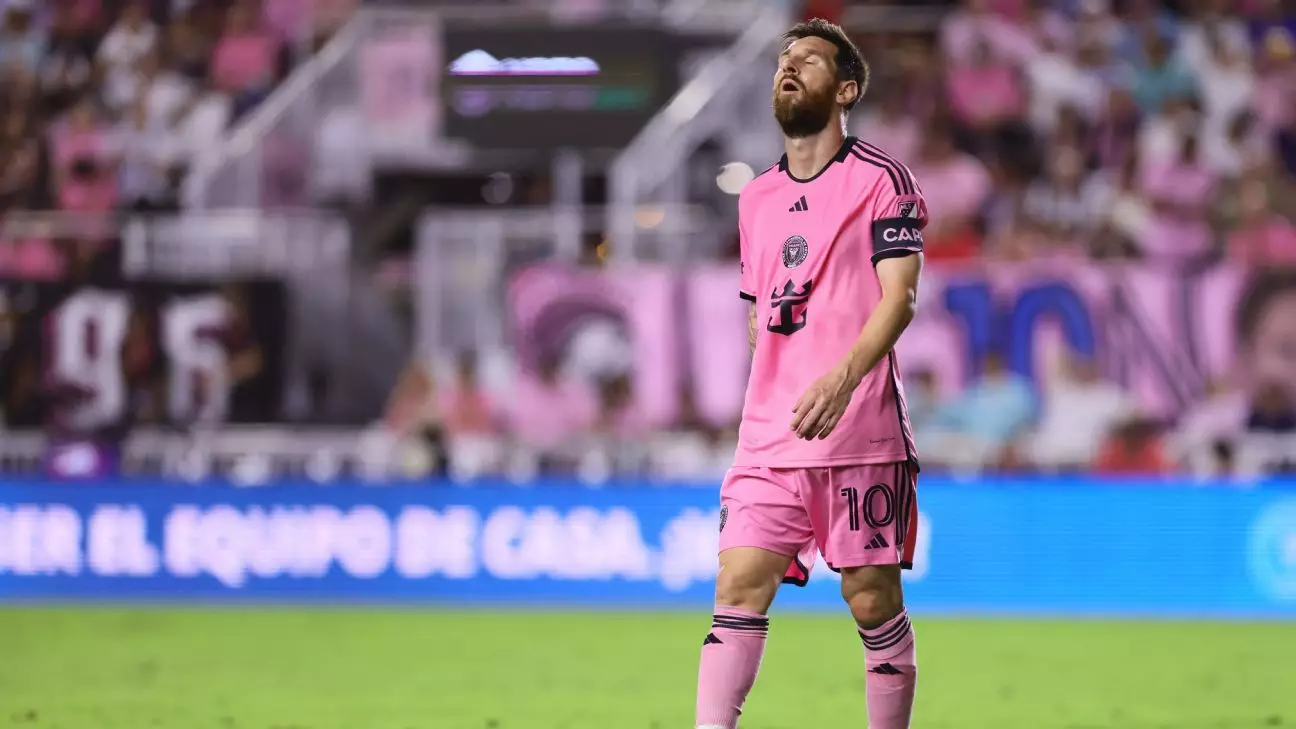As the final whistle echoed through Chase Stadium amid a billowing cloud of disbelief, over 20,000 Inter Miami fans were left grappling with the reality of their team’s abrupt exit from the 2024 MLS playoffs. The universal expectation was for the squad—anchored by global soccer icons Lionel Messi and Luis Suárez—to make a deep run in the postseason. Instead, this heavy favorite stumbled in the first round against the Atlanta United, a team that had conclusively finished ninth in the Eastern Conference, 34 points behind Miami during the regular season. The shocking defeat has raised a plethora of questions regarding the underlying issues that have plagued the team throughout the year.
Miami’s tumultuous season was marked by an alarmingly high number of injuries that effectively debilitated their efforts right from the onset. Questions surrounding the preseason strategy loom large as they embarked on an overly ambitious tour covering three continents, logging more than 28,000 miles in flights alone. Messi himself acknowledged the toll this took, emphasizing how crucial it was for the club to engage in such global visibility, despite it yielding an unproductive preseason. The impact became glaringly evident when promising players like Facundo Farías succumbed to serious injuries even before the regular season commenced, an ill-fated omen for what was supposed to be a championship-caliber year.
Compounding the issue, by just a month into the regular season, Miami bore the dubious distinction of having the most players on the league’s injury report—seven players sidelined at one juncture significantly weakened the team’s roster. This initial injury crisis morphed into a chronic concern, as critical absences accumulated throughout the year. Not only did Messi miss crucial matches, but integral players such as Redondo and defensive anchors Kryvtsov and Avilés struggled to maintain any semblance of fitness. The cascading injuries drew attention to a roster that could not withstand the rigors of a lengthy and demanding season, thereby posing a threat to Miami’s ambitions.
The challenges Miami faced weren’t strictly due to bad luck; there were evident flaws in roster management and depth planning. The club’s reliance on high-profile signings like Messi, Suárez, and Sergio Busquets created an overdependence that was exacerbated by injuries. Coach Gerardo Martino was thrust into a perpetual cycle of short-term fixes, making hasty emergency signings to fill the gaps left by absentees. However, without a proper structure supporting these stars, Miami encountered difficulties in maintaining a competitive edge in multi-tournament situations—an oversight that became painfully apparent when they were eliminated from both the Concacaf Champions Cup and the Leagues Cup, in addition to their humbling playoff exit.
Martino’s adjustments to the lineup were often reactive and did little to address the systemic shortcomings of the roster. The club’s inability to build a balanced team meant that once key players like Messi and Suárez were underperforming or unavailable, there were few reliable alternatives to step up. As illustrated in the playoffs, the lack of a cohesive game plan persisted until the end, often resulting in makeshift formations that failed to deliver against organized opponents.
With the 2024 season behind them, Inter Miami must take decisive action if they wish to reestablish themselves as championship contenders. The shortcomings this year underscored the urgent need for a thoroughly revised approach to roster construction, particularly in enhancing depth across key positions. Inevitably, they must focus on supplementary signings that can bolster their starting XI while also providing necessary rotation options, alleviating the burden on their aging stars.
The critical need to address injury management cannot be overstated. Implementing a more carefully crafted preseason strategy aimed at minimizing travel and maximizing player preparation can enhance performance longevity throughout the season. This much-needed recalibration must begin now as they prepare for an action-packed 2025 season that promises to feature multiple competitions, including MLS, the Concacaf Champions Cup, the Leagues Cup, and even the Club World Cup.
As the clock ticks on significant roster decisions, Miami’s management faces both challenges and opportunities. Extending contracts for some of their key players will be crucial, alongside identifying reliable reinforcements for the backline and midfield. Both Martino and sporting director Chris Henderson must prioritize building a balanced, competitive roster that doesn’t overly rely on stars but can effectively capitalize on their brilliance when fully fit.
While Messi’s contract runs through the next season, raising questions about his future remains part of the strategic planning. The pressure mounts for Inter Miami to transform their vulnerabilities into strengths as they gaze upon a new chapter. Drawing from the lessons learned through a season riddled with challenges, the Herons have the opportunity to evolve into not just a crowd-pleasing spectacle, but a robust contender for multiple trophies in the upcoming year. Fans can only hope that the mistakes of 2024 lay the groundwork for a more promising future.

Leave a Reply